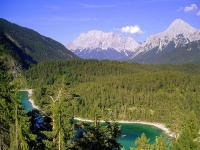Visit worldtravels.com for the full guide to Austria. Build a complete Austria travel guide and email to your clients - sign up for a trial subscription of World Travels Pro.
Austria

Landlocked in the heart of Europe, Austria runs from the Alps in the west down to Vienna and the Danube in the east. For six centuries it was the heart of the mighty Hapsburg Empire, which at its peak included what is now Poland, Hungary and the Czech Republic along with much of Romania, Bulgaria and the Balkans. The country's imperial inheritance is particularly striking in the grand buildings and cultural institutions of the Baroque-flavoured capital, Vienna, resplendent with palaces and captivating churches, cosy coffeehouses and inns, and grand ballrooms where Strauss waltzes still draw dancers onto the floor.
Another of the great classical composers spawned by Austria was Mozart, born in Salzburg, a beautiful historic city where stunning Baroque churches rise up against the backdrop of the Austrian Alps. The Alps stretch west to Switzerland and in winter skiers come from all continents to carve the slopes and experience the charm of the alpine villages and their welcoming inhabitants.
The charm of Austria may lie in its preservation of a romantic classical past, but this does not mean modern Austria has stood back from development. Behind the stunning scenery and antique architecture a vibrant industrial and commercial society goes about its business in the cities and towns. Austrians work hard, but they also know how to play hard. Austrian hospitality and cuisine are legendary. From a cruise on the magnificent Danube River to a cycle tour through the Alpine meadows or a breath-taking day's sightseeing in busy Vienna, visitors to Austria find it impossible to fit in a dull moment.
Climate
Austria enjoys a temperate Central European climate with four distinct seasons. Summers are hot with cool nights. In Vienna and other low-lying cities temperatures during the day can get uncomfortably hot over July and August. Winters are cold, below freezing in January and February. The ski season in the Alps runs from December to April but the mountains are also popular with hikers and climbers over the summer when the weather is usually warm and bright.
Money
The unit of currency is the Euro (EUR), which is divided into 100 cents. Currency can be exchanged at banks and bureaux de change available in all towns, but it may be easier to use the ATMs. Banks are closed on Saturdays and Sundays, but exchange offices at airports and major city rail terminals are open seven days a week. Major credit and debit cards are widely accepted though some small hotels and restaurants may only accept cash. Travellers cheques are also accepted.
Passport Visa
The borderless region known as the Schengen area includes the following countries: Austria, Belgium, Czech Republic, Denmark, Estonia, Finland, France, Germany, Greece, Hungary, Iceland, Italy, Latvia, Lithuania, Luxembourg, Malta, The Netherlands, Norway, Poland, Portugal, Slovakia, Slovenia, Spain and Sweden. All these countries issue a standard Schengen visa that has a multiple entry option that allows the holder to travel freely within the borders of all.
Entry Requirements
- US passport holders require a passport but a visa is not needed for a stay of up to three months.
- A visa is required, except for holders of a British passport stating British Citizen or British National (Overseas), or endorsed British Overseas Territories Citizen or British Subject with the Right of Abode label issued by the United Kingdom.
- Canadians require a passport but a visa is not needed for a stay of up to three months.
- Australians require a passport but a visa is not needed for a stay of up to three months.
- South African nationals require a passport and a Schengen visa for travel to Austria. Holders of temporary passports will be refused entry.
- Irish nationals require a passport but no visa is needed for travel to Austria.
- New Zealanders require a passport but a visa is not needed for a stay of up to three months.
Health
No vaccinations are necessary for business visits or general tourism in Austria. There is, however, a risk of tick-borne encephalitis for long-term visitors who expect to be visiting rural or forested areas in spring or summer. These travellers should consider vaccination and ensure they take precautions against tick infestation. Water and food are safe. Medical facilities are excellent. Medical insurance is advised unless from the UK - citizens of EU countries can get free emergency medical treatment at public hospitals in Austria on production of a European Health Insurance Card (EHIC). Bird flu was found in dead swans in the southern province of Styria in February 2006 and stringent measures were taken to contain the outbreak. The risk is very low for travellers, but all close contact with wild, domestic and caged birds should be avoided, and all poultry and egg dishes well cooked as a precaution.
Embassy Consulates
- Austrian Embassy, Washington DC, United States: +1 202 895 6700.
- Austrian Embassy, London, United Kingdom: +44 (0)20 7344 3250.
- Austrian Embassy, Ottawa, Canada: +1 613 789 1444.
- Austrian Embassy, Canberra, Australia: +61 (0)2 6295 1533.
- Austrian Embassy, Pretoria, South Africa: +27 (0)12 452 9155.
- Austrian Embassy, Dublin, Ireland: +353 (0)1 269 4577.
- Consulate of Austria, Wellington, New Zealand: +64 (0)4 384 1402.
Foreign Embassies
- United States Embassy, Vienna: +43 (0)1 313 390.
- British Embassy, Vienna: +43 (0)1 716 130.
- Canadian Embassy, Vienna: +43 (0)1 531 383 000.
- Australian Embassy, Vienna: +43 (0)1 506 740.
- South African Embassy, Vienna: +43 (0)1 320 6493.
- Embassy of Ireland, Vienna: +43 (0)1 715 4246.
- New Zealand Consulate-General, Vienna: +43 (0)1 318 8505.







